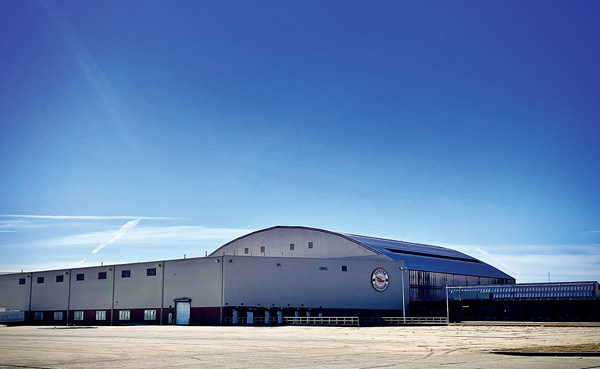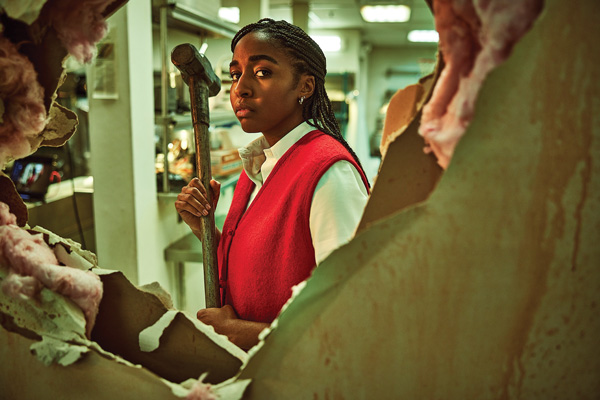To grow an established film industry, one must advance along with the diverse needs of production, and Illinois is doing just that.
In many ways, the state has solidified its place as a darling for industry professionals. Film and television giants Apple TV+, Disney, FX, HBO Max, NBC, Netflix, Warner Brothers and 20th Century Fox for example find themselves returning to Illinois year after year to deliver blockbuster hits.
While there is no doubt in the availability of scenic, physical shooting locations across the Prairie State, its state-wide portfolio must include an array of soundstages that afford unique advantages to the life of any film or television production. In heeding the call, Governor JB Pritzker and the Illinois Department of Commerce and Economic Opportunity (DCEO) announced a crisp $10 million would be awarded to three studio projects throughout the state in February 2024.
“This is the first time DCEO’s Film Office has had a grant program specifically aimed at film and TV soundstage infrastructure,” says Illinois Film Office Director Peter Hawley. “Illinois is on track to make film a billion-dollar industry. Good infrastructure — stages and crews — are necessary to getting there. The Illinois Soundstage Capital Grant is a signal that the State of Illinois is committed to the long-term success of the film industry and ensuring soundstages are available for productions.”
The Illinois Soundstage Program awardees included The Field Studios ($5 million), Fresh Films ($3.8 million) and Flyover Film Studios ($1.1 million).
Of the three, Fresh Films has had firm roots in the state for over 20 years, based in the Quad Cities community of Rock Island, Illinois. The Fields Studios and Flyover Film Studios are representative of the new kids on the block, albeit each project’s developers are far from green in terms of film and television industry expertise.
Set For Take-Off
Two years ago, Shatterglass Films Co-Owner Jennifer Shelby gained first-hand experience working on a movie shot in and around Champaign County’s Village of Rantoul. A warm welcome and readiness to support the project from the community and Village administration alike made for a lasting impact.
Flyover Film Studios emerged in Champaign County soon after. Shelby, Luke Boyce and Brett Hays of Shatterglass Films partnered with The Line Film Company’s Sarah Sharp and Rob Stern and Dustin Hoke of Dustin Hoke Services. All now have set out to ensure East Central Illinois has the infrastructure in place to drive production in the region.
The team found a location that had all the characteristics to allow this dream to take flight. The former Chanute Air Force Base, located in Rantoul, came ready-made with more than six acres to build upon and 290,000-sq.-ft. of interior space in Hangar One, accompanied by 40-foot ceilings.
“The funding from the Illinois Soundstage Grant Program will be a huge boon to our project,” says Shelby, who now serves as president of Flyover Film Studios. “It was thanks to the grant that we were able to move our project completion date to the fall of 2026.”
For every dollar invested by the state there is a $6.81 overall return on investment, Olsberg SPI found in its recent study ‘Economic Impact of the Illinois Film Production Services Tax Credit.
Prior to the arrival of grant funding, initial work on the studio consists of building out production offices, standing sets and organizing supplies and equipment offerings. Standing sets include an array of settings such as a police station, classroom, bank lobby and a real commercial plane. With the $1.1 million award in place, Flyover will move forward with the construction of four soundstages across 100,000 sq. ft and include additional mill space for crew. Initial plans were made for only two soundstages, Shelby states that the additional two will allow the studio to accommodate more productions.
 Flyover Film Studios is revamping a former Air Force base into a new production studio.
Flyover Film Studios is revamping a former Air Force base into a new production studio.
Photo courtesy of Flyover Film Studios
“Not only will the stage development attract productions, but the entire infrastructure of vendors, crew members, locations, background actors and more that we are building will continue to make Central Illinois a more sought-after destination,” says Shelby. “When you partner all of this with a place that offers vast amounts of free or low-cost parking, highly affordable permits and a trained work force, we will be hard to beat.”

Flyover Film Studios encompasses the space and capacity for all types of film and television productions, including commercials and music videos. It will also provide the region’s universities and colleges an opportunity to carry out film projects in partnership with Flyover Film Studios.
“The main purpose of Flyover Film Studios is to offer movie makers the physical space needed for filming and simultaneously ensure they have the support needed for filming in a non-traditional area for the industry,” says Shelby.
About two hours north in Chicago, Knickpoint Studios has officially opened doors to The Fields Studios. Home to nine soundstages across 132,000 sq. ft. and more than 350,000 sq. ft. of production and office space, this massive purpose-built studio was awarded $5 million through the Illinois Soundstage Program.
The funding will be used toward the construction of interior spaces within the studio’s main building. Once complete, the project looks to welcome a number of local, independent vendors to the space to service the needs of productions operating here.
Fresh Films has plans to use its $3.8 million grant funding toward the construction of its new $12 million film studio in Rock Island County. The project is anticipated to break ground in early 2025, though a specific site within the county has yet to be announced. According to Fresh Films, it will introduce studio space and training center. As of now plans include two 20,000-sq.-ft. soundstages, mill space, production support spaces and a training stage.
“The studio will serve as a catalyst to diversify the local economy, not just in job creation for local talent but also in how it can attract professionals from the entertainment industry, spurring the growth of related businesses and services which adds to the overall financial health of the community,” said Fresh Films Founder and Managing Director Kelli Feigley. “The grant is an investment in economic growth, cultural enrichment, and community development, with far-reaching benefits for the Western Illinois region and for the State of Illinois.”
Come One, Come All
Much of the movie magic that has commenced throughout the state since the early 2000s can be attributed to the growth of the Illinois Production Services Tax Credit.
An uncapped, 30% transferable tax credit on eligible expenditures, with an added 15% for salaries paid to underrepresented Illinois-based crew, has been a gamechanger solidifying Illinois as a sought-after film destination.
Research conducted by creative industries consultancy Olsberg SPI showed that the overall impact of the film tax credit cannot be overstated. Without it, only 6.4% of current production expenditure would be active. The study states that the other 93.6% can be attributed directly to the incentive’s presence.
From 2012 to 2022, the tax credit supported an average of 261 projects a year, a production expenditure of $404 million in that period. Data concluded that for every dollar invested by the State resulted in a $6.81 overall return on investment.
Since 2022, Illinois legislative amendments to the state’s film tax credit have resulted in raising the credit’s salary cap from only covering the first $100,000 of Illinois resident salaries to now covering the first $500,000 for qualified resident and nonresident salaries.
In a more recent move, the passage of HB 5005 will now allow game shows, competition shows and national talk show productions to qualify for the Illinois Production Services Tax Credit.

